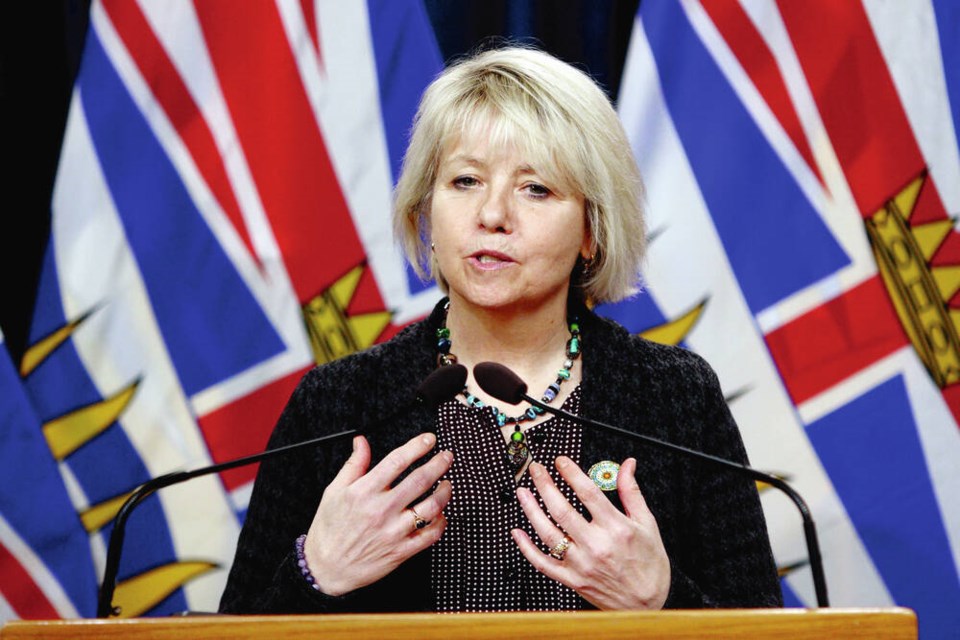Flu rates continue to decline following a sharp early peak in November and December, RSV levels remain high but are levelling off, and COVID-19 cases remain steady, Dr. Bonnie Henry said in a respiratory illness update Friday.
There’s also been a rash of cases of norovirus, which results in vomiting and fever, in community and health-care settings.
“We’re not out of the woods by any means yet,” said the provincial health officer, although Influenza A and B has dropped from a peak of 27 per cent positive tests in November to five per cent now.
Influenza A, the H3N2 virus, caused the most illness and more severe illness, particularly in children and the elderly. Another wave of Influenza B is expected later this season but is not expected to be as severe because most people have been exposed to it.
No further child deaths beyond the six revealed in early December have been detected, Henry said.
Henry said just 24 cases of the latest Omicron subvariant, XBB.1.5 or Kraken, have been identified via whole genome sequencing of positive COVID tests in the province. The variant is identified in five or six per cent of whole genome sequences, Henry said.
Ninety-five per cent of cases remain driven by the BQ.1.1, another Omicron subvariant. “Each new one that spreads, by definition, is the most infectious one to date, and we’ve seen that with XBB.1.5,” said Henry.
She said vaccines are still providing strong protection from serious illness and death, especially in those who have had the bivalent booster. Even with just two shots, people are four to eight-fold less likely to have serious illness and hospitalization compared with an individual who is not vaccinated, she said.
The province is not considering a mask mandate, as some groups are requesting, said Henry.
Broad measures such as gathering restrictions and mask mandates can’t stop all transmissions, and can take a mental-health toll, she said.
Henry said the province is doing much more testing for respiratory viruses than it ever did before.
About 1,000 PCR tests are performed on average each day, and genome sequencing is now being done on any positive COVID test from a hospital or in the community through the Canadian Influenza Sentinel Practitioner Surveillance Network in ÎÚÑ»´«Ã½ “This really gives us a sense of what strains we’re seeing in BC and if they’ve changed,” said Henry.
Wastewater surveillance, ongoing since 2020, has expanded with additional testing sites in Interior Health and Island Health. Public health is also looking at genome sequencing of Influenza A and B and RSV detected in wastewater, said Henry.
“It has not been done around the country or around the world, so this will be something that will give us a sense in the future of what types of influenza we’re seeing and where the burden of that is,” she said.
In addition, the Public Health Agency of ÎÚÑ»´«Ã½ has expanded its wastewater surveillance to include Vancouver International Airport. “It’s something that we’ve been wanting to do for some time — not just on flights from China, which helps us understand what strains are circulating there, but from other places in the world, too,” Henry said
Health Minister Adrian Dix said ÎÚÑ»´«Ã½ hospitals are at 110 per cent of base bed capacity, and 87 per cent of total base and surge bed capacity.
“There’s a historically high level of people in our hospitals,” said Dix. “That was true between Christmas and New Years when compared to other seasons, and it’s true now.”
From Dec. 18-24, he said, health authorities performed 4,698 surgeries, compared to 2,574 in the same week in 2019, prior to the pandemic. “So that’s a significant and historic number of surgeries completed, even as the health system faces these challenges.”
Between Jan. 1 to 7, however, 190 surgeries were postponed, including 23 in Island Health. “A very significant number of those surgeries will be rescheduled and done very soon,” said Dix.




